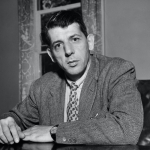I
In a detachment cool as the glint of light
on wet roads through wet spruce, or iced mountains
hailed from the sea in moonfill, or the sea
when one horizon’s black and the other burning;
the gulls are kissing time in its own flowing
over the shell-scraped rocka coming and going
as of glass bees with a bubble of light in each
running errands in and out of the sunset.
Over the road and the spruce wood, over the ice,
and out the picture of my picture window,
the exorbitant separation of nature from nature
wheels, whirls, and dances on itself.
Now damn me for a moral. Over and out,
over and in, the gulls drift up afire,
screaming like hinges in the broken air
of night and day like two smokes on the sea.
And I do nothing. A shadow three feet under
my window in the light, I look at light
in one of the years of my life. This or another.
Or all together. Or simply in this moment.
II
Lead flags of the sea. Steel furls of the surf.
Day smoke and night smoke. fire at the smoke’s top.
A calm of the world in the eye of passion.
The day that sank birdless from staring Calvary
was another. And only another. And no other
than the clucking calm of Eden fussed to rest
from the black bush afire in the first eye.
A calm-in-violence like Aegean time.
Day smoke and night smoke over the palled sea
tensed for a clash of tridents. Far ashore,
a staring army camped beside a temple,
the base of the temple black with powder stains,
the pediment flashing wild in light above.
—A day of the world in which a part of the world
looked at another, two parts of a mist.
At Cassino the dusty German wetting his lips,
his eyes crashed in his face like unhatched birds’ eggs
splashed from their nest, looked East from the burning night.
There was no West. Light came from nowhere behind him,
slanted, flowed level, drained. He looked out, waiting.
Where had it come from, the light of his terrible patience?
A dead man waited to die on the shell-scraped
stones of another god, dust of the stones
caked to his body, rivers of blood within him
ran to their dusty sea beside the world.
Calm in his changes, risen from his changes,
he looked his life out at the smoking world.
III
I have no more to do than what I wait for
under the changing light and the gulls afire
in rays of rose-quartz. Holy ghosts of the sea,
they rise in light from behind me. The light lifts
long from the edge of the world and juts away
over the top of the dark. My life sits
visible to itself; and I sit still
in a company of survivors and the dead.
Jew. Greek, German, man at the edge of himself
in the long light over the worlds he ran to
to save unsaved. I practice the man in all,
clutching the world from the world to praise it.




















Comment form: